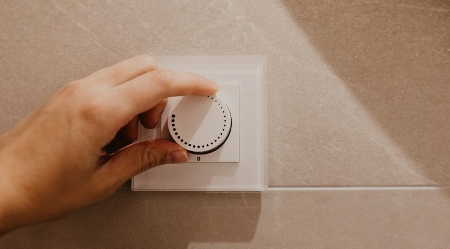Dimmers are handy tools that make lighting more personal. The advancements in dimmer switches have...
How to Save Energy by Using Dimmer Switches
 Energy bills are a necessary expense. However, it’s also an expense that can grow if you’re not careful. In particular, electricity costs you during periods of extreme weather, and as many in the Washington, DC area know, this means summer and winter.
Energy bills are a necessary expense. However, it’s also an expense that can grow if you’re not careful. In particular, electricity costs you during periods of extreme weather, and as many in the Washington, DC area know, this means summer and winter.
That said, several energy-saving tips can help reduce your electric bill. The key is turning each into a habit that you incorporate into your daily life.
Start With the Simple Dimmer Switch
Let’s start with Dimmer Switch 101. A dimmer switch’s role is to increase or decrease the flow of electricity to a light bulb – in other words, make the bulb brighter or less bright. When you dim your lights, the result is both aesthetic appeal and energy reduction.
There will be times you require a lot of light, but if you don’t, get used to setting a dimmer switch lower to reduce the amount of electricity used. If you invest in Smart Home dimmer switches, you can make it easier on yourself by automating. Set brightness levels according to the time of day or for routines, or let the dimmer switch utilize the brightness memory feature.
Take your energy savings one step further by investing in LEDs throughout your home. Used in tandem with dimmer switches, you can further reduce the amount of electricity used. There is an important caveat, however. LED lights are known to flicker on dimmers UNLESS paired with a compatible dimmer. Not all LED dimmable bulbs work properly with all LED compatible dimmer switches. Sometimes, the Spec Sheet for an LED light fixture will provide the type and even model number for recommended compatible dimmers. If not, consult with Wilcox Electric's procurement experts to ensure that the LED light(s) and dimmer switch to be installed are compatible.
Other Easy Ways to Save Energy
Saving energy requires some thought, but like anything else in life, it can become a habit. Here are some easy ways to save more energy:
- Wash your clothes in cold water. Did you know that 90% of the energy used in the washing process is to heat the water? Make a move to wash as many items in cold water as possible. There are several benefits to washing clothes in cold water. For example, stains like blood or sweat set in hot water. Cold water prevents shrinking and fading in many cases, and delicate fabrics do best in cold water as well.
- Cover food in the fridge. Are you someone who places leftovers in the refrigerator uncovered, or keeps them in takeout containers? Moisture released in the fridge makes the compressor work harder. By placing foods in lidded containers or covering with plastic wrap, you'll reduce the energy your fridge has to use.
- Adjust your shades depending on the season. Covering windows to block sunlight can prevent your home from heating quickly in the summer. In the winter, you'll want open windows to let the radiant light help heat your home. Get used to using your shades to help your heating/cooling system work more efficiently and reduce your electric bills. Do you have smart shades? Then program seasonal routines.
- Unplug and turn off. From computers to fans, anything running when you're not using it eats up extra electricity. Get in the habit of shutting down the computer before you go in order to reduce your energy bills.
Any steps you take to reduce your energy usage will reflect on your electric bill. Start by using your dimmer switches, and add as many energy-saving tips to your daily routine as possible. The savings will start adding up in no time.



